Health Economics: Too Much Medicine and Its Adverse Effects on Patients' Health
VerifiedAdded on 2022/11/18
|9
|2276
|219
AI Summary
This report mainly focuses on the research article of Hensher et al. 2017 that opines the definition of overconsumption of medicine and how it affects the patients' health. It also discusses the drawbacks of the research paper and various implications for health leadership and management.
Contribute Materials
Your contribution can guide someone’s learning journey. Share your
documents today.
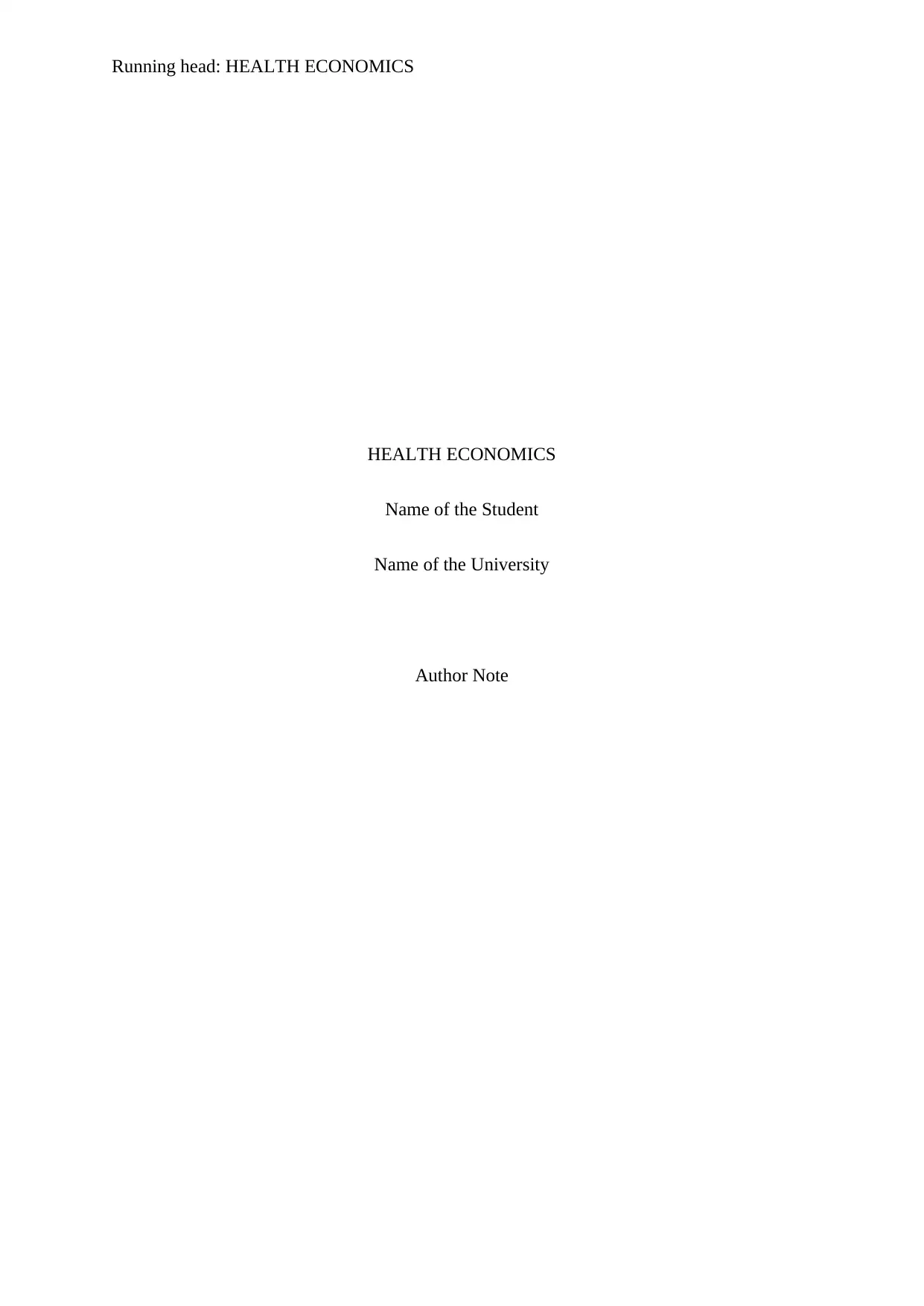
Running head: HEALTH ECONOMICS
HEALTH ECONOMICS
Name of the Student
Name of the University
Author Note
HEALTH ECONOMICS
Name of the Student
Name of the University
Author Note
Secure Best Marks with AI Grader
Need help grading? Try our AI Grader for instant feedback on your assignments.
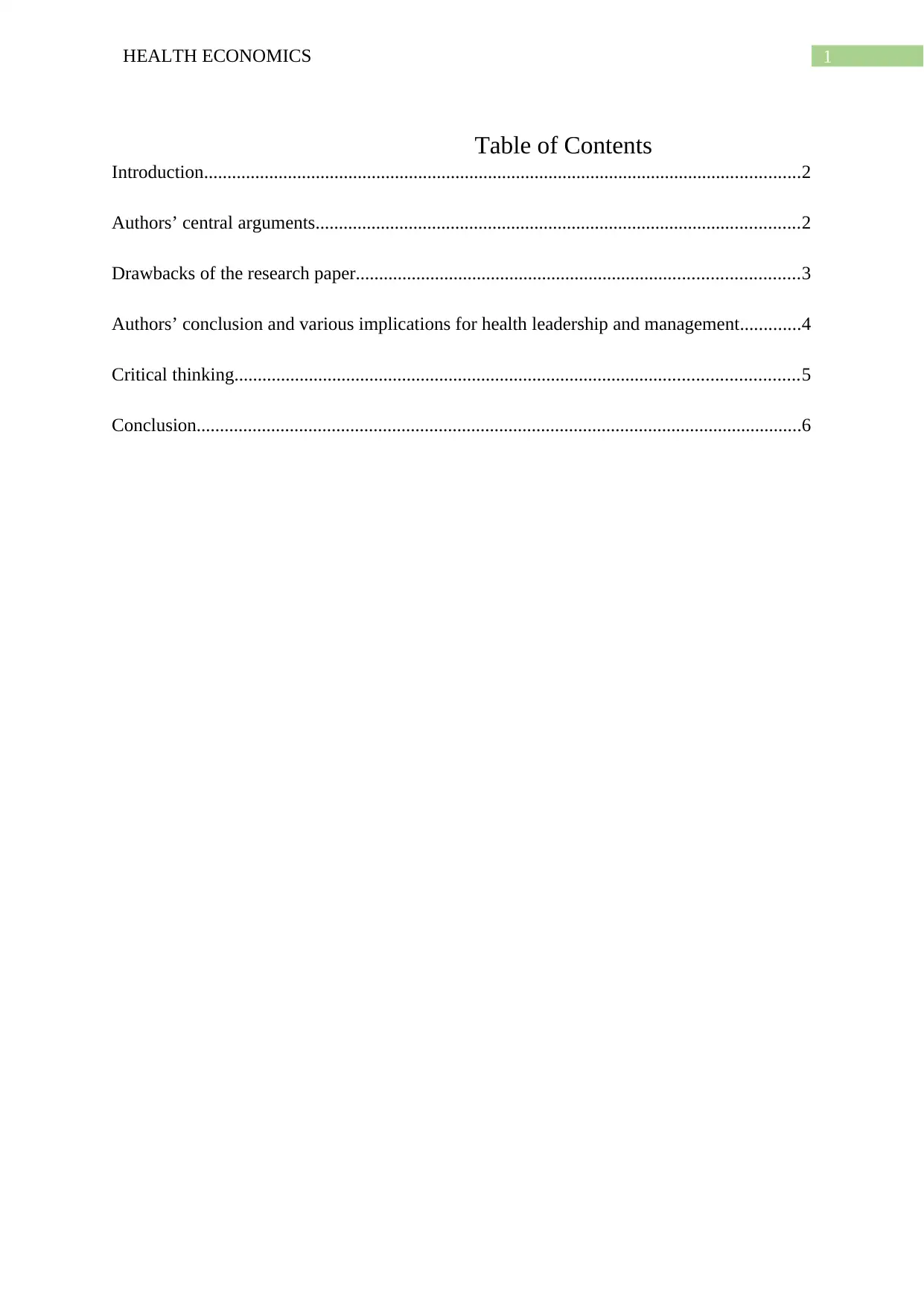
1HEALTH ECONOMICS
Table of Contents
Introduction................................................................................................................................2
Authors’ central arguments........................................................................................................2
Drawbacks of the research paper...............................................................................................3
Authors’ conclusion and various implications for health leadership and management.............4
Critical thinking.........................................................................................................................5
Conclusion..................................................................................................................................6
Table of Contents
Introduction................................................................................................................................2
Authors’ central arguments........................................................................................................2
Drawbacks of the research paper...............................................................................................3
Authors’ conclusion and various implications for health leadership and management.............4
Critical thinking.........................................................................................................................5
Conclusion..................................................................................................................................6
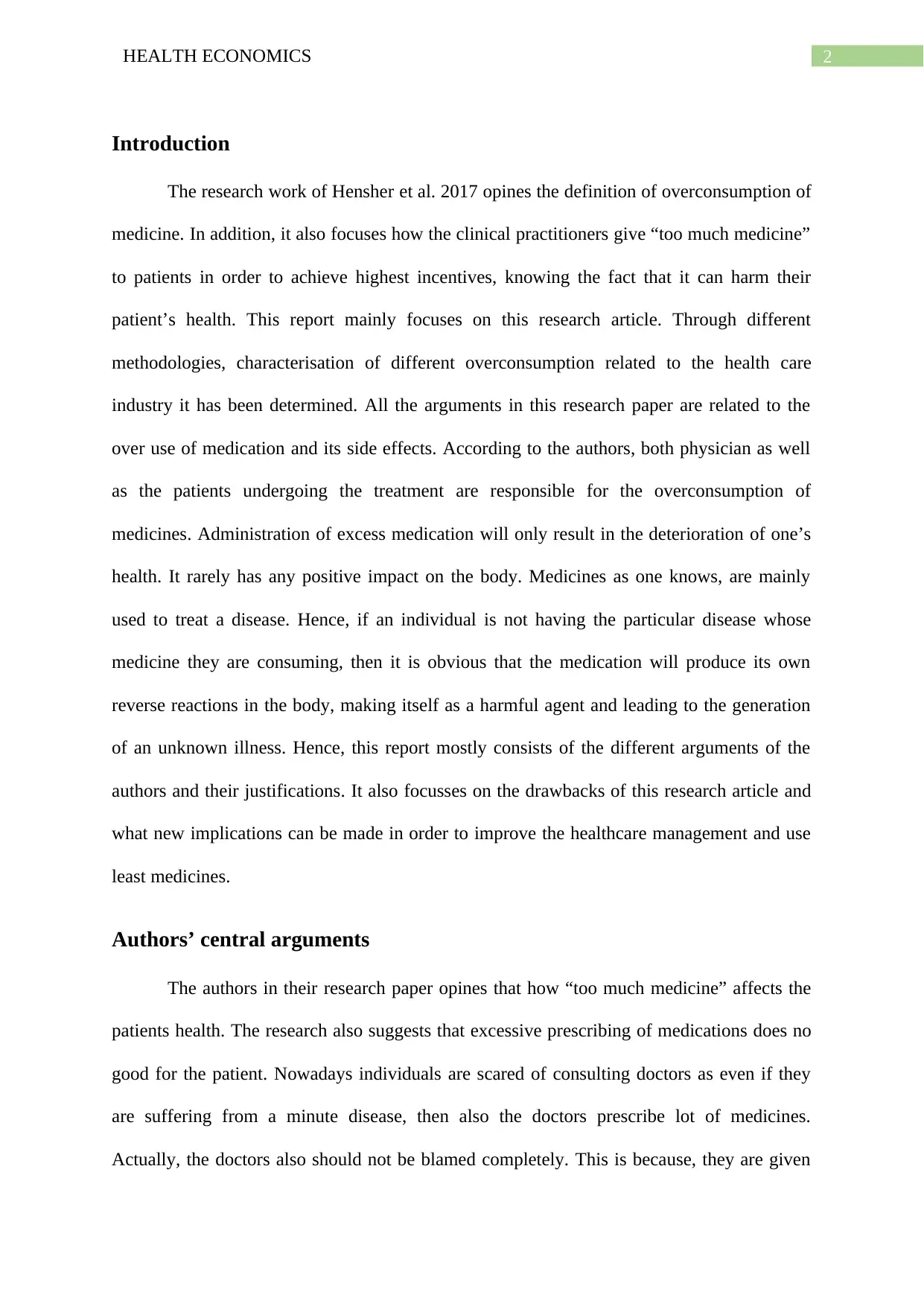
2HEALTH ECONOMICS
Introduction
The research work of Hensher et al. 2017 opines the definition of overconsumption of
medicine. In addition, it also focuses how the clinical practitioners give “too much medicine”
to patients in order to achieve highest incentives, knowing the fact that it can harm their
patient’s health. This report mainly focuses on this research article. Through different
methodologies, characterisation of different overconsumption related to the health care
industry it has been determined. All the arguments in this research paper are related to the
over use of medication and its side effects. According to the authors, both physician as well
as the patients undergoing the treatment are responsible for the overconsumption of
medicines. Administration of excess medication will only result in the deterioration of one’s
health. It rarely has any positive impact on the body. Medicines as one knows, are mainly
used to treat a disease. Hence, if an individual is not having the particular disease whose
medicine they are consuming, then it is obvious that the medication will produce its own
reverse reactions in the body, making itself as a harmful agent and leading to the generation
of an unknown illness. Hence, this report mostly consists of the different arguments of the
authors and their justifications. It also focusses on the drawbacks of this research article and
what new implications can be made in order to improve the healthcare management and use
least medicines.
Authors’ central arguments
The authors in their research paper opines that how “too much medicine” affects the
patients health. The research also suggests that excessive prescribing of medications does no
good for the patient. Nowadays individuals are scared of consulting doctors as even if they
are suffering from a minute disease, then also the doctors prescribe lot of medicines.
Actually, the doctors also should not be blamed completely. This is because, they are given
Introduction
The research work of Hensher et al. 2017 opines the definition of overconsumption of
medicine. In addition, it also focuses how the clinical practitioners give “too much medicine”
to patients in order to achieve highest incentives, knowing the fact that it can harm their
patient’s health. This report mainly focuses on this research article. Through different
methodologies, characterisation of different overconsumption related to the health care
industry it has been determined. All the arguments in this research paper are related to the
over use of medication and its side effects. According to the authors, both physician as well
as the patients undergoing the treatment are responsible for the overconsumption of
medicines. Administration of excess medication will only result in the deterioration of one’s
health. It rarely has any positive impact on the body. Medicines as one knows, are mainly
used to treat a disease. Hence, if an individual is not having the particular disease whose
medicine they are consuming, then it is obvious that the medication will produce its own
reverse reactions in the body, making itself as a harmful agent and leading to the generation
of an unknown illness. Hence, this report mostly consists of the different arguments of the
authors and their justifications. It also focusses on the drawbacks of this research article and
what new implications can be made in order to improve the healthcare management and use
least medicines.
Authors’ central arguments
The authors in their research paper opines that how “too much medicine” affects the
patients health. The research also suggests that excessive prescribing of medications does no
good for the patient. Nowadays individuals are scared of consulting doctors as even if they
are suffering from a minute disease, then also the doctors prescribe lot of medicines.
Actually, the doctors also should not be blamed completely. This is because, they are given
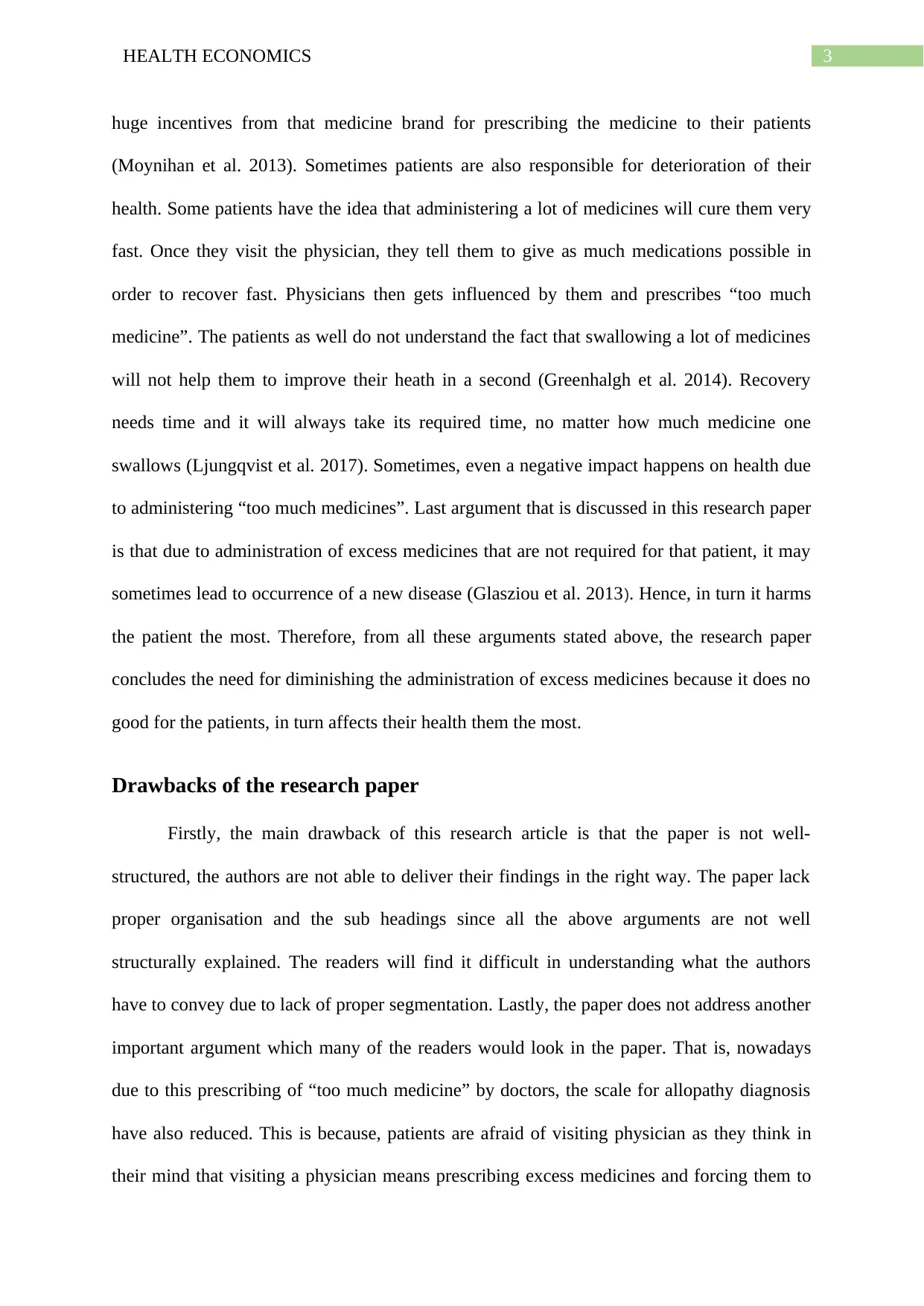
3HEALTH ECONOMICS
huge incentives from that medicine brand for prescribing the medicine to their patients
(Moynihan et al. 2013). Sometimes patients are also responsible for deterioration of their
health. Some patients have the idea that administering a lot of medicines will cure them very
fast. Once they visit the physician, they tell them to give as much medications possible in
order to recover fast. Physicians then gets influenced by them and prescribes “too much
medicine”. The patients as well do not understand the fact that swallowing a lot of medicines
will not help them to improve their heath in a second (Greenhalgh et al. 2014). Recovery
needs time and it will always take its required time, no matter how much medicine one
swallows (Ljungqvist et al. 2017). Sometimes, even a negative impact happens on health due
to administering “too much medicines”. Last argument that is discussed in this research paper
is that due to administration of excess medicines that are not required for that patient, it may
sometimes lead to occurrence of a new disease (Glasziou et al. 2013). Hence, in turn it harms
the patient the most. Therefore, from all these arguments stated above, the research paper
concludes the need for diminishing the administration of excess medicines because it does no
good for the patients, in turn affects their health them the most.
Drawbacks of the research paper
Firstly, the main drawback of this research article is that the paper is not well-
structured, the authors are not able to deliver their findings in the right way. The paper lack
proper organisation and the sub headings since all the above arguments are not well
structurally explained. The readers will find it difficult in understanding what the authors
have to convey due to lack of proper segmentation. Lastly, the paper does not address another
important argument which many of the readers would look in the paper. That is, nowadays
due to this prescribing of “too much medicine” by doctors, the scale for allopathy diagnosis
have also reduced. This is because, patients are afraid of visiting physician as they think in
their mind that visiting a physician means prescribing excess medicines and forcing them to
huge incentives from that medicine brand for prescribing the medicine to their patients
(Moynihan et al. 2013). Sometimes patients are also responsible for deterioration of their
health. Some patients have the idea that administering a lot of medicines will cure them very
fast. Once they visit the physician, they tell them to give as much medications possible in
order to recover fast. Physicians then gets influenced by them and prescribes “too much
medicine”. The patients as well do not understand the fact that swallowing a lot of medicines
will not help them to improve their heath in a second (Greenhalgh et al. 2014). Recovery
needs time and it will always take its required time, no matter how much medicine one
swallows (Ljungqvist et al. 2017). Sometimes, even a negative impact happens on health due
to administering “too much medicines”. Last argument that is discussed in this research paper
is that due to administration of excess medicines that are not required for that patient, it may
sometimes lead to occurrence of a new disease (Glasziou et al. 2013). Hence, in turn it harms
the patient the most. Therefore, from all these arguments stated above, the research paper
concludes the need for diminishing the administration of excess medicines because it does no
good for the patients, in turn affects their health them the most.
Drawbacks of the research paper
Firstly, the main drawback of this research article is that the paper is not well-
structured, the authors are not able to deliver their findings in the right way. The paper lack
proper organisation and the sub headings since all the above arguments are not well
structurally explained. The readers will find it difficult in understanding what the authors
have to convey due to lack of proper segmentation. Lastly, the paper does not address another
important argument which many of the readers would look in the paper. That is, nowadays
due to this prescribing of “too much medicine” by doctors, the scale for allopathy diagnosis
have also reduced. This is because, patients are afraid of visiting physician as they think in
their mind that visiting a physician means prescribing excess medicines and forcing them to
Secure Best Marks with AI Grader
Need help grading? Try our AI Grader for instant feedback on your assignments.
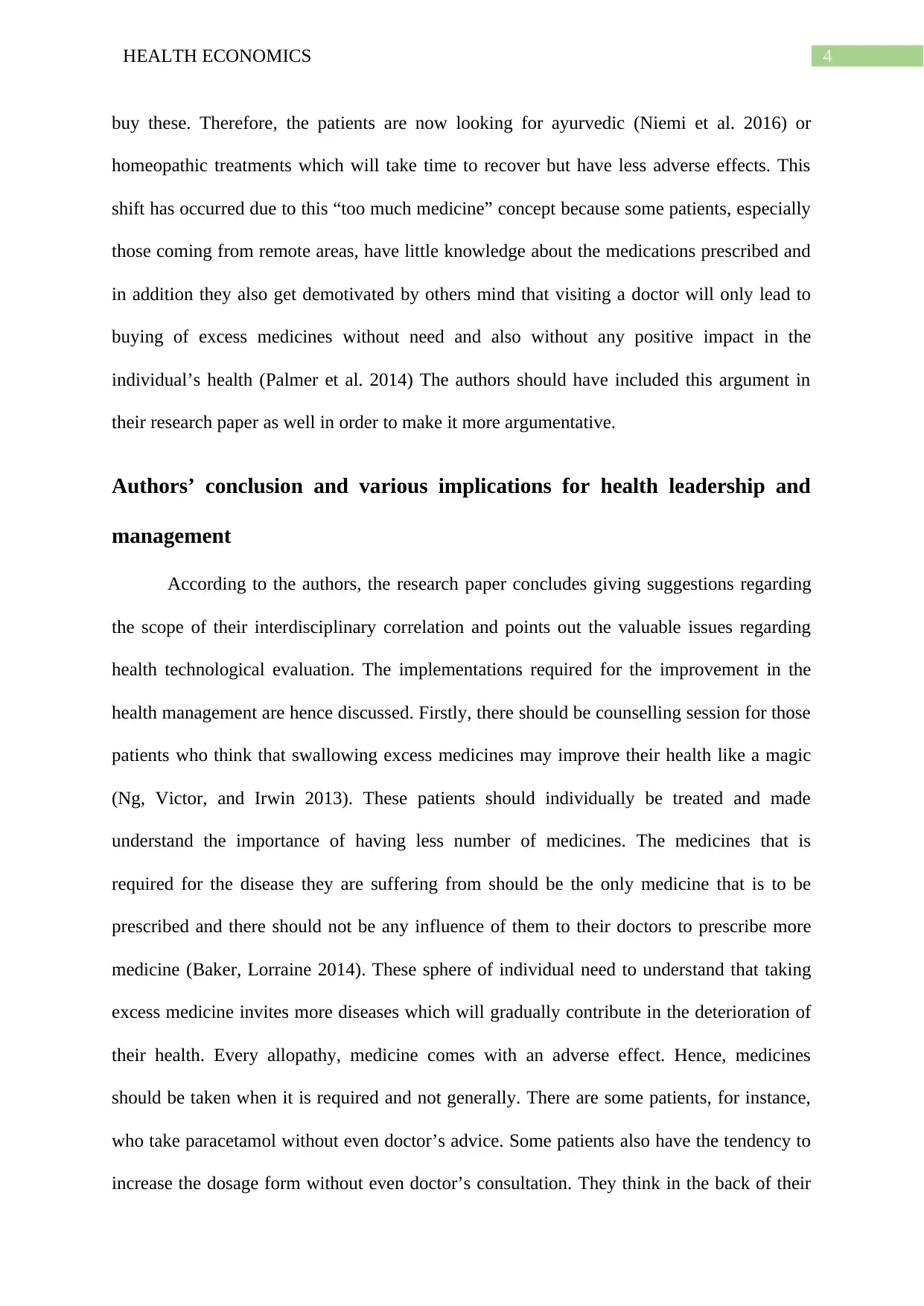
4HEALTH ECONOMICS
buy these. Therefore, the patients are now looking for ayurvedic (Niemi et al. 2016) or
homeopathic treatments which will take time to recover but have less adverse effects. This
shift has occurred due to this “too much medicine” concept because some patients, especially
those coming from remote areas, have little knowledge about the medications prescribed and
in addition they also get demotivated by others mind that visiting a doctor will only lead to
buying of excess medicines without need and also without any positive impact in the
individual’s health (Palmer et al. 2014) The authors should have included this argument in
their research paper as well in order to make it more argumentative.
Authors’ conclusion and various implications for health leadership and
management
According to the authors, the research paper concludes giving suggestions regarding
the scope of their interdisciplinary correlation and points out the valuable issues regarding
health technological evaluation. The implementations required for the improvement in the
health management are hence discussed. Firstly, there should be counselling session for those
patients who think that swallowing excess medicines may improve their health like a magic
(Ng, Victor, and Irwin 2013). These patients should individually be treated and made
understand the importance of having less number of medicines. The medicines that is
required for the disease they are suffering from should be the only medicine that is to be
prescribed and there should not be any influence of them to their doctors to prescribe more
medicine (Baker, Lorraine 2014). These sphere of individual need to understand that taking
excess medicine invites more diseases which will gradually contribute in the deterioration of
their health. Every allopathy, medicine comes with an adverse effect. Hence, medicines
should be taken when it is required and not generally. There are some patients, for instance,
who take paracetamol without even doctor’s advice. Some patients also have the tendency to
increase the dosage form without even doctor’s consultation. They think in the back of their
buy these. Therefore, the patients are now looking for ayurvedic (Niemi et al. 2016) or
homeopathic treatments which will take time to recover but have less adverse effects. This
shift has occurred due to this “too much medicine” concept because some patients, especially
those coming from remote areas, have little knowledge about the medications prescribed and
in addition they also get demotivated by others mind that visiting a doctor will only lead to
buying of excess medicines without need and also without any positive impact in the
individual’s health (Palmer et al. 2014) The authors should have included this argument in
their research paper as well in order to make it more argumentative.
Authors’ conclusion and various implications for health leadership and
management
According to the authors, the research paper concludes giving suggestions regarding
the scope of their interdisciplinary correlation and points out the valuable issues regarding
health technological evaluation. The implementations required for the improvement in the
health management are hence discussed. Firstly, there should be counselling session for those
patients who think that swallowing excess medicines may improve their health like a magic
(Ng, Victor, and Irwin 2013). These patients should individually be treated and made
understand the importance of having less number of medicines. The medicines that is
required for the disease they are suffering from should be the only medicine that is to be
prescribed and there should not be any influence of them to their doctors to prescribe more
medicine (Baker, Lorraine 2014). These sphere of individual need to understand that taking
excess medicine invites more diseases which will gradually contribute in the deterioration of
their health. Every allopathy, medicine comes with an adverse effect. Hence, medicines
should be taken when it is required and not generally. There are some patients, for instance,
who take paracetamol without even doctor’s advice. Some patients also have the tendency to
increase the dosage form without even doctor’s consultation. They think in the back of their
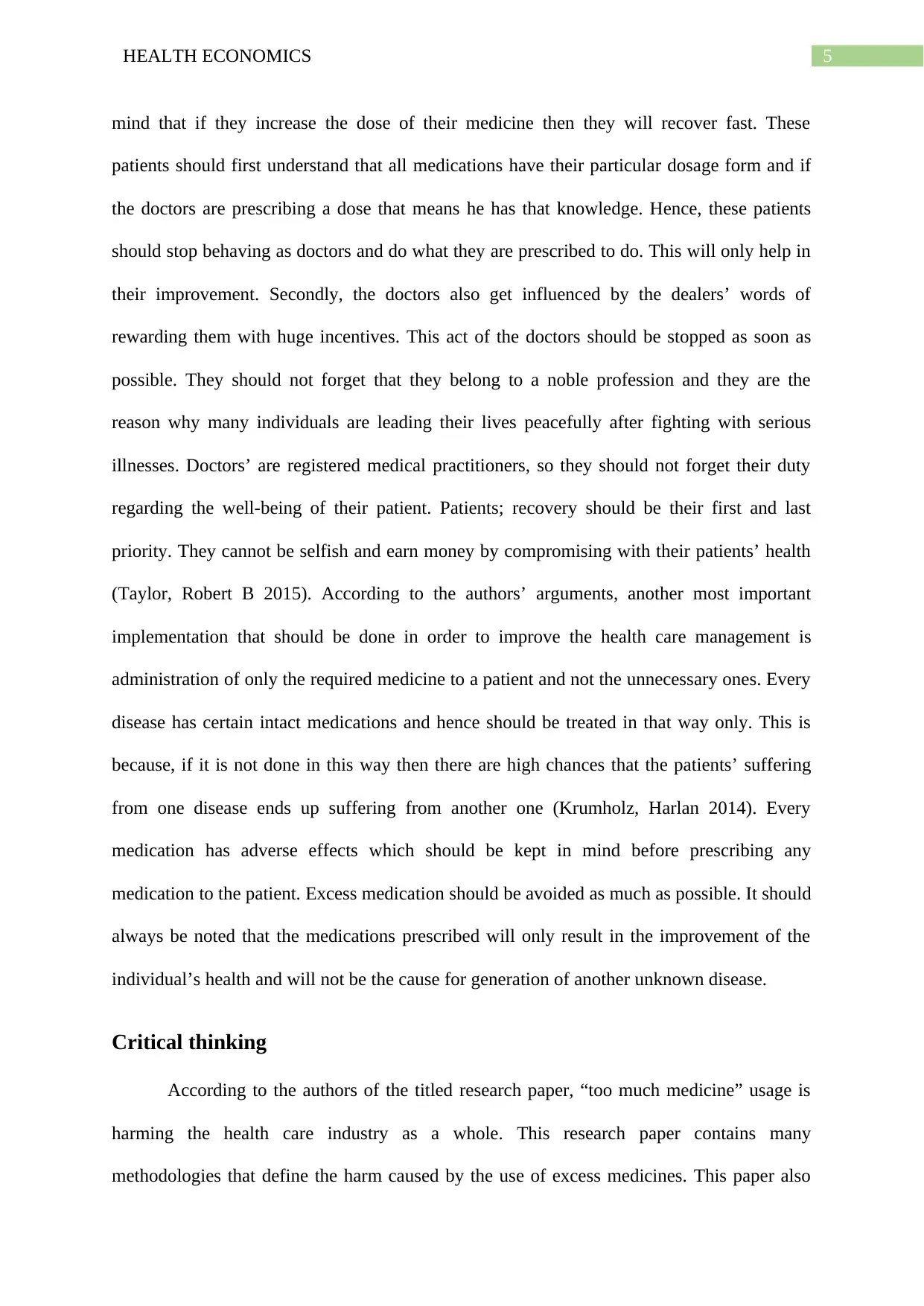
5HEALTH ECONOMICS
mind that if they increase the dose of their medicine then they will recover fast. These
patients should first understand that all medications have their particular dosage form and if
the doctors are prescribing a dose that means he has that knowledge. Hence, these patients
should stop behaving as doctors and do what they are prescribed to do. This will only help in
their improvement. Secondly, the doctors also get influenced by the dealers’ words of
rewarding them with huge incentives. This act of the doctors should be stopped as soon as
possible. They should not forget that they belong to a noble profession and they are the
reason why many individuals are leading their lives peacefully after fighting with serious
illnesses. Doctors’ are registered medical practitioners, so they should not forget their duty
regarding the well-being of their patient. Patients; recovery should be their first and last
priority. They cannot be selfish and earn money by compromising with their patients’ health
(Taylor, Robert B 2015). According to the authors’ arguments, another most important
implementation that should be done in order to improve the health care management is
administration of only the required medicine to a patient and not the unnecessary ones. Every
disease has certain intact medications and hence should be treated in that way only. This is
because, if it is not done in this way then there are high chances that the patients’ suffering
from one disease ends up suffering from another one (Krumholz, Harlan 2014). Every
medication has adverse effects which should be kept in mind before prescribing any
medication to the patient. Excess medication should be avoided as much as possible. It should
always be noted that the medications prescribed will only result in the improvement of the
individual’s health and will not be the cause for generation of another unknown disease.
Critical thinking
According to the authors of the titled research paper, “too much medicine” usage is
harming the health care industry as a whole. This research paper contains many
methodologies that define the harm caused by the use of excess medicines. This paper also
mind that if they increase the dose of their medicine then they will recover fast. These
patients should first understand that all medications have their particular dosage form and if
the doctors are prescribing a dose that means he has that knowledge. Hence, these patients
should stop behaving as doctors and do what they are prescribed to do. This will only help in
their improvement. Secondly, the doctors also get influenced by the dealers’ words of
rewarding them with huge incentives. This act of the doctors should be stopped as soon as
possible. They should not forget that they belong to a noble profession and they are the
reason why many individuals are leading their lives peacefully after fighting with serious
illnesses. Doctors’ are registered medical practitioners, so they should not forget their duty
regarding the well-being of their patient. Patients; recovery should be their first and last
priority. They cannot be selfish and earn money by compromising with their patients’ health
(Taylor, Robert B 2015). According to the authors’ arguments, another most important
implementation that should be done in order to improve the health care management is
administration of only the required medicine to a patient and not the unnecessary ones. Every
disease has certain intact medications and hence should be treated in that way only. This is
because, if it is not done in this way then there are high chances that the patients’ suffering
from one disease ends up suffering from another one (Krumholz, Harlan 2014). Every
medication has adverse effects which should be kept in mind before prescribing any
medication to the patient. Excess medication should be avoided as much as possible. It should
always be noted that the medications prescribed will only result in the improvement of the
individual’s health and will not be the cause for generation of another unknown disease.
Critical thinking
According to the authors of the titled research paper, “too much medicine” usage is
harming the health care industry as a whole. This research paper contains many
methodologies that define the harm caused by the use of excess medicines. This paper also
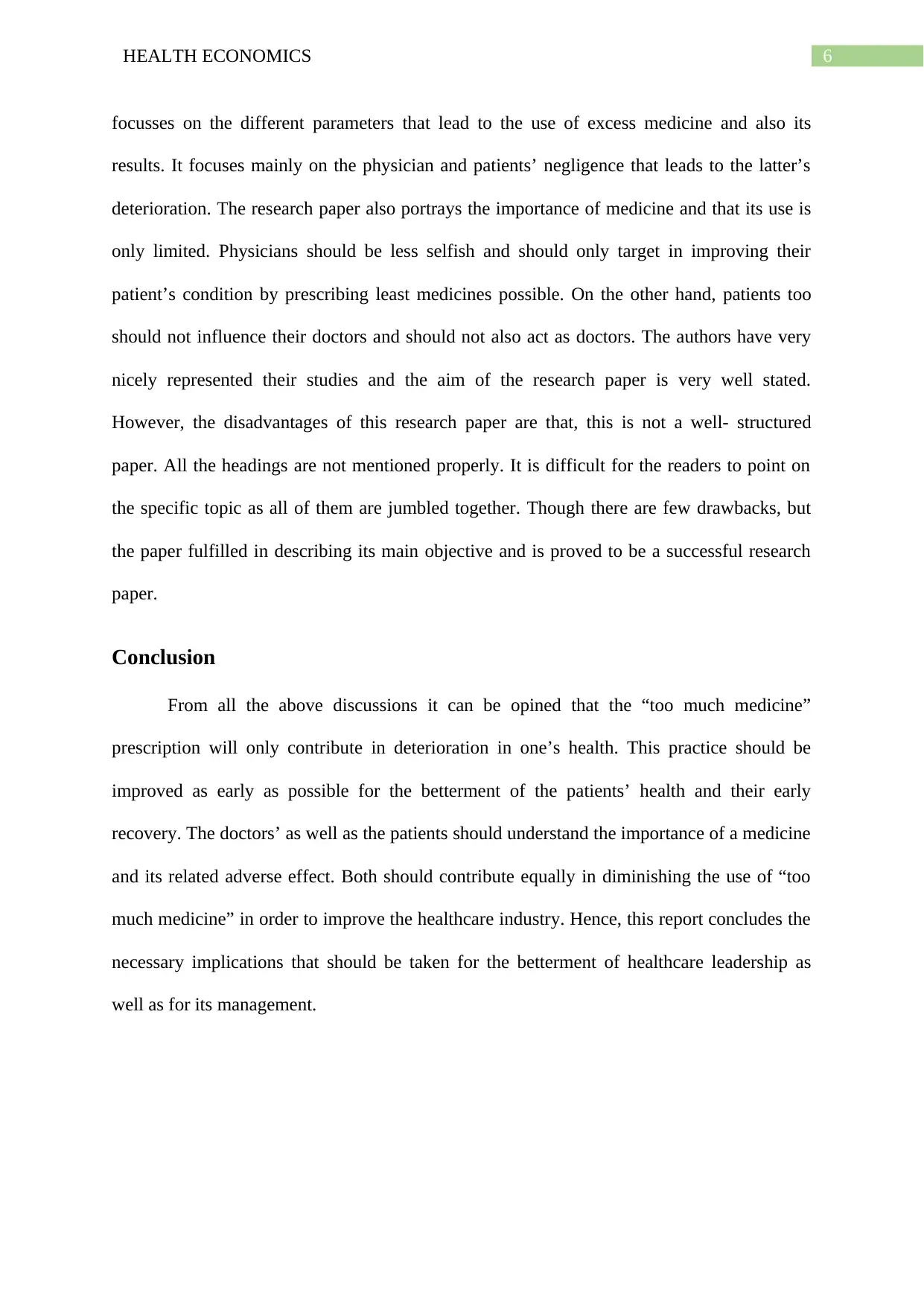
6HEALTH ECONOMICS
focusses on the different parameters that lead to the use of excess medicine and also its
results. It focuses mainly on the physician and patients’ negligence that leads to the latter’s
deterioration. The research paper also portrays the importance of medicine and that its use is
only limited. Physicians should be less selfish and should only target in improving their
patient’s condition by prescribing least medicines possible. On the other hand, patients too
should not influence their doctors and should not also act as doctors. The authors have very
nicely represented their studies and the aim of the research paper is very well stated.
However, the disadvantages of this research paper are that, this is not a well- structured
paper. All the headings are not mentioned properly. It is difficult for the readers to point on
the specific topic as all of them are jumbled together. Though there are few drawbacks, but
the paper fulfilled in describing its main objective and is proved to be a successful research
paper.
Conclusion
From all the above discussions it can be opined that the “too much medicine”
prescription will only contribute in deterioration in one’s health. This practice should be
improved as early as possible for the betterment of the patients’ health and their early
recovery. The doctors’ as well as the patients should understand the importance of a medicine
and its related adverse effect. Both should contribute equally in diminishing the use of “too
much medicine” in order to improve the healthcare industry. Hence, this report concludes the
necessary implications that should be taken for the betterment of healthcare leadership as
well as for its management.
focusses on the different parameters that lead to the use of excess medicine and also its
results. It focuses mainly on the physician and patients’ negligence that leads to the latter’s
deterioration. The research paper also portrays the importance of medicine and that its use is
only limited. Physicians should be less selfish and should only target in improving their
patient’s condition by prescribing least medicines possible. On the other hand, patients too
should not influence their doctors and should not also act as doctors. The authors have very
nicely represented their studies and the aim of the research paper is very well stated.
However, the disadvantages of this research paper are that, this is not a well- structured
paper. All the headings are not mentioned properly. It is difficult for the readers to point on
the specific topic as all of them are jumbled together. Though there are few drawbacks, but
the paper fulfilled in describing its main objective and is proved to be a successful research
paper.
Conclusion
From all the above discussions it can be opined that the “too much medicine”
prescription will only contribute in deterioration in one’s health. This practice should be
improved as early as possible for the betterment of the patients’ health and their early
recovery. The doctors’ as well as the patients should understand the importance of a medicine
and its related adverse effect. Both should contribute equally in diminishing the use of “too
much medicine” in order to improve the healthcare industry. Hence, this report concludes the
necessary implications that should be taken for the betterment of healthcare leadership as
well as for its management.
Paraphrase This Document
Need a fresh take? Get an instant paraphrase of this document with our AI Paraphraser
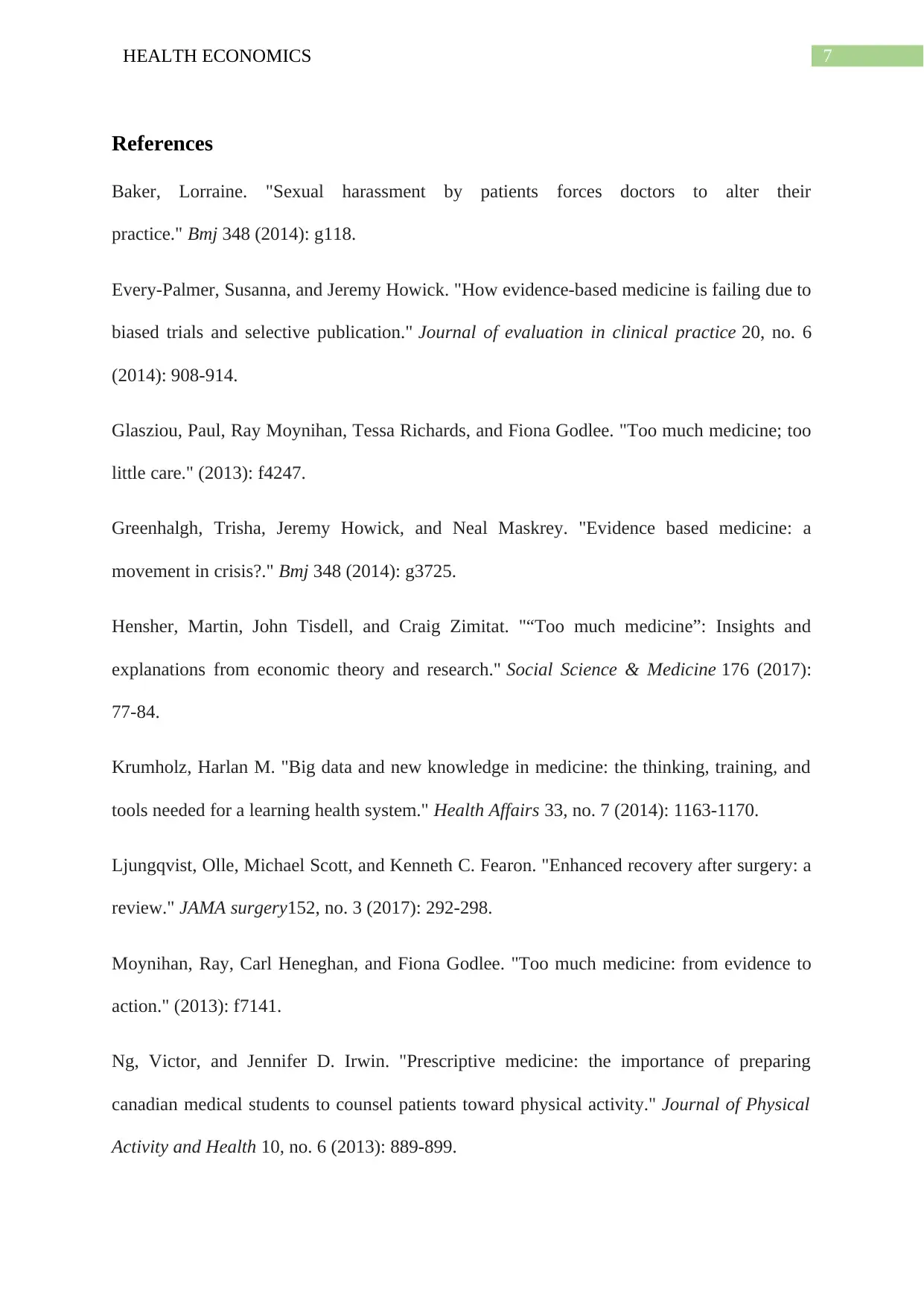
7HEALTH ECONOMICS
References
Baker, Lorraine. "Sexual harassment by patients forces doctors to alter their
practice." Bmj 348 (2014): g118.
Every‐Palmer, Susanna, and Jeremy Howick. "How evidence‐based medicine is failing due to
biased trials and selective publication." Journal of evaluation in clinical practice 20, no. 6
(2014): 908-914.
Glasziou, Paul, Ray Moynihan, Tessa Richards, and Fiona Godlee. "Too much medicine; too
little care." (2013): f4247.
Greenhalgh, Trisha, Jeremy Howick, and Neal Maskrey. "Evidence based medicine: a
movement in crisis?." Bmj 348 (2014): g3725.
Hensher, Martin, John Tisdell, and Craig Zimitat. "“Too much medicine”: Insights and
explanations from economic theory and research." Social Science & Medicine 176 (2017):
77-84.
Krumholz, Harlan M. "Big data and new knowledge in medicine: the thinking, training, and
tools needed for a learning health system." Health Affairs 33, no. 7 (2014): 1163-1170.
Ljungqvist, Olle, Michael Scott, and Kenneth C. Fearon. "Enhanced recovery after surgery: a
review." JAMA surgery152, no. 3 (2017): 292-298.
Moynihan, Ray, Carl Heneghan, and Fiona Godlee. "Too much medicine: from evidence to
action." (2013): f7141.
Ng, Victor, and Jennifer D. Irwin. "Prescriptive medicine: the importance of preparing
canadian medical students to counsel patients toward physical activity." Journal of Physical
Activity and Health 10, no. 6 (2013): 889-899.
References
Baker, Lorraine. "Sexual harassment by patients forces doctors to alter their
practice." Bmj 348 (2014): g118.
Every‐Palmer, Susanna, and Jeremy Howick. "How evidence‐based medicine is failing due to
biased trials and selective publication." Journal of evaluation in clinical practice 20, no. 6
(2014): 908-914.
Glasziou, Paul, Ray Moynihan, Tessa Richards, and Fiona Godlee. "Too much medicine; too
little care." (2013): f4247.
Greenhalgh, Trisha, Jeremy Howick, and Neal Maskrey. "Evidence based medicine: a
movement in crisis?." Bmj 348 (2014): g3725.
Hensher, Martin, John Tisdell, and Craig Zimitat. "“Too much medicine”: Insights and
explanations from economic theory and research." Social Science & Medicine 176 (2017):
77-84.
Krumholz, Harlan M. "Big data and new knowledge in medicine: the thinking, training, and
tools needed for a learning health system." Health Affairs 33, no. 7 (2014): 1163-1170.
Ljungqvist, Olle, Michael Scott, and Kenneth C. Fearon. "Enhanced recovery after surgery: a
review." JAMA surgery152, no. 3 (2017): 292-298.
Moynihan, Ray, Carl Heneghan, and Fiona Godlee. "Too much medicine: from evidence to
action." (2013): f7141.
Ng, Victor, and Jennifer D. Irwin. "Prescriptive medicine: the importance of preparing
canadian medical students to counsel patients toward physical activity." Journal of Physical
Activity and Health 10, no. 6 (2013): 889-899.
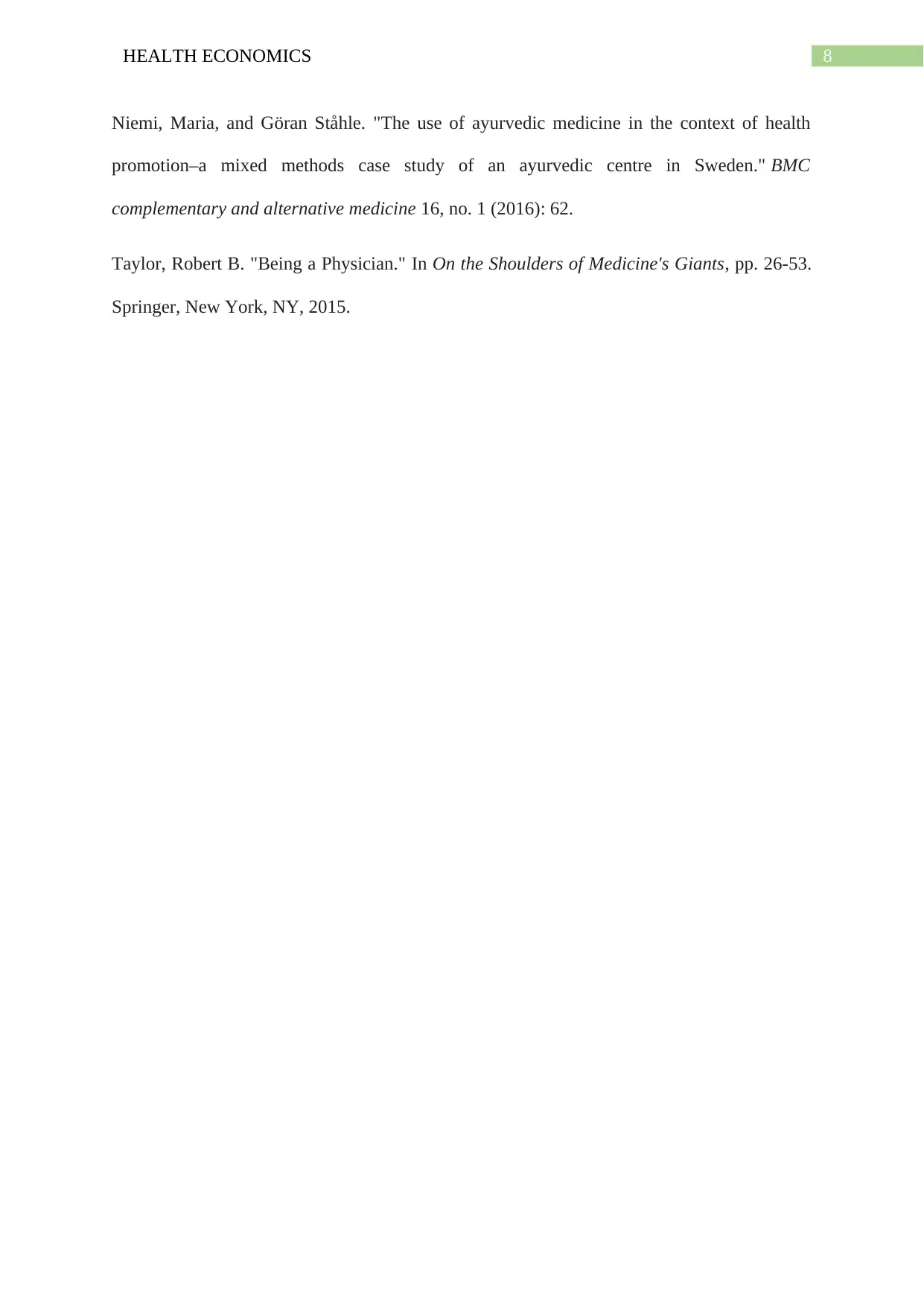
8HEALTH ECONOMICS
Niemi, Maria, and Göran Ståhle. "The use of ayurvedic medicine in the context of health
promotion–a mixed methods case study of an ayurvedic centre in Sweden." BMC
complementary and alternative medicine 16, no. 1 (2016): 62.
Taylor, Robert B. "Being a Physician." In On the Shoulders of Medicine's Giants, pp. 26-53.
Springer, New York, NY, 2015.
Niemi, Maria, and Göran Ståhle. "The use of ayurvedic medicine in the context of health
promotion–a mixed methods case study of an ayurvedic centre in Sweden." BMC
complementary and alternative medicine 16, no. 1 (2016): 62.
Taylor, Robert B. "Being a Physician." In On the Shoulders of Medicine's Giants, pp. 26-53.
Springer, New York, NY, 2015.
1 out of 9
Related Documents
Your All-in-One AI-Powered Toolkit for Academic Success.
+13062052269
info@desklib.com
Available 24*7 on WhatsApp / Email
![[object Object]](/_next/static/media/star-bottom.7253800d.svg)
Unlock your academic potential
© 2024 | Zucol Services PVT LTD | All rights reserved.





